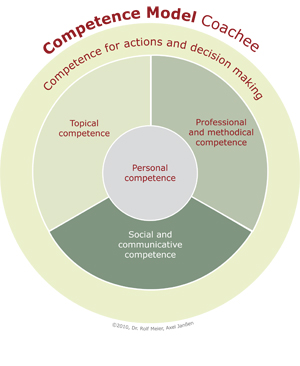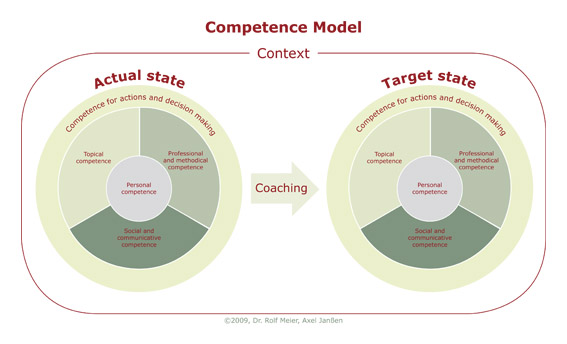Modelo de Competencia Coachee
The competence model of the Hamburger Schule
is first and foremost a generally accepted model. A model is the
reduced complexity and abstract depiction of reality. It describes
in an abstract way the abilities and skills which a human being
has needed to develop within a particular context in order to be
successful in this context.
The competence model, which is also valid for the context “coaching”,
is made up of 5 topical areas which can be studied individually but
also interact in a situation:
- Personal competence
- Professional and methodical competence
- Social-communicative competence
- Topical competence
- Competence for actions and decision making
|
 |
Personal competence
Personal competence means having identified one’s own feelings, motives,
needs and values within a context and to be able to assess one’s own
behaviour.
Professional and methodical competence
Professional and methodical competence means possessing the professional know-how
and skills for a context and being able to organise work processes in a results-oriented
way within this context.
Social-communicative competence
Social-communicative competence means dealing with, in a self-controlled fashion,
feelings, motives, needs and values of one’s self and of other people
and recognising differences in order to be able to agree upon a social context
which incorporates the interests of all those involved.
Topical competence
Topical competence means having had reflected experience in a field, in a topic
or culturally within a context.
Competence for actions and decision making
Competence for actions and decision making means being able to recognise the
meaning of a context, differences to other contexts as well as being able
to coordinate all of one’s own resources into situational individual
action.
Based upon the question: “if the coachee has managed to gain competences
in the sense of self-guidance within his topical context - what kind of self-learn
concept does he then still require?” then reaching the coachee’s
objective (the change topic) is mirrored in the competence model.
The handling of a coaching reason with the aim of a sustainable self-learn
concept requires, therefore, the identification (analysis) of existing competences
within the relevant context and the identification of further necessary competences
of the coachee.
The reflection of competences by the coachee within this context requires a
sustainable self-learn concept.

Through coaching, the coachee develops on the basis of a self-diagnosed actual
competence a target competence within the topical context. The “sustainable
self-learn concept” means that the coachee is conscious of his individually
aspired target competence and is able to develop relevant behaviours on his
own as well as also use these in similar topical contexts.
|









